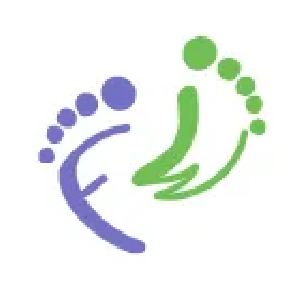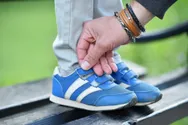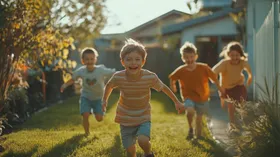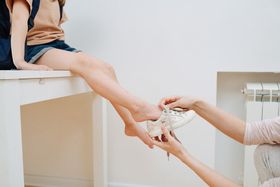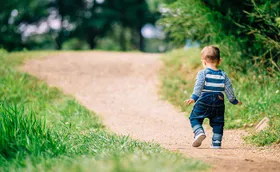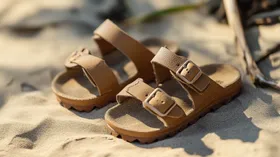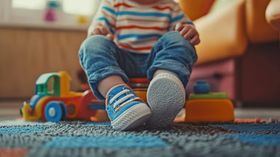10 Important Child Feet Care Points Every Parent Should Know
Updated June 10, 2025
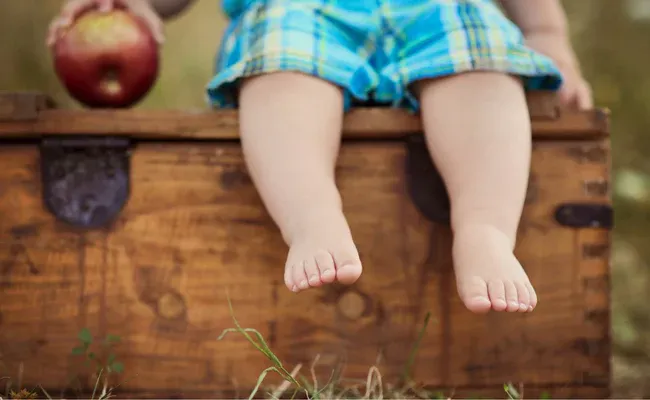
Proper care and maintenance of your child’s feet are important. It hugely contributes to your child’s health, happiness and success in life. Fit and strong feet means unrestricted mobility, better posture, enhanced confidence and limitless possibilities in life.
Your child’s feet and legs consist of growing bones and muscles. Proper care is required in order for them to grow properly and strong. It is too risky to let nature take its course. As a parent, you have to take a proactive stand to ensure the health and wellness of your child. Here are ten basic child feet care points to note;
Observe proper feet and nail care
Integral to taking care of your child’s feet is taking care of his or her toenails. Always cut the nails short, but not too close to the skin. Cut straight across. Curving at this age will encourage the dreaded in-growing toenails.
Keep feet dry as much as possible. Wash your child’s feet with warm water and soap at least once a day. Immediately dry feet after washing, bathing or getting wet in the rain. Make sure that feet are clean and dry before putting on shoes. Fungi and bacteria thrive in damp and dirty places.
Always find the right shoe size
Shoes should always be the right fit. Do not be tempted into buying bigger shoes they can use longer. The shoe should comfortably accommodate the longest toe. Use socks to pad if shoes are slightly bigger. Regularly check the shoes for scuffed toes and other signs that your child has already outgrown his or her shoes.
Only use the right socks
Sock size matters. Too tight-fitting and restrictive socks can cause discomfort and possible disfigurement when used constantly. On the other hand, too loose socks can bunch up and impair balance and could cause tripping, falling and other accidents. Socks should fit snugly and comfortably. Also choose soft, ‘breathable’ and comfy sock materials. It is also wise to wash new socks before letting your child wear them.
Avoid hand-me-down shoes
Letting younger kids wear grown-out shoes from older siblings is a popular practice among multi-kid families. It might be able to save you some dollars, but this practice is also harmful to your child’s feet. The insides of the shoes mould into a unique comfortable shape of the user’s feet over time. While it is perfectly comfortable for the first user, the shoes will never fit another one’s feet.
Buy only child-specific shoes
Children’s shoes are specifically designed and constructed to accommodate the needs of growing feet. Kids’ shoes feature pads, inserts and braces to support developing bones and muscles. They are also wider than the regular shoes. Other important features include pliable and slip-resistant soles, easy and simple closures, wide and flat heel and wide or rounded toes.
Different shoes for different activities
Provide your child with the appropriate footwear for any given activity. While his or her school shoes is perfect for walking and all-day extended wear, it will not do for more strenuous activities. Toddlers should be adequately shod for their day outings – sturdy boots are perfect when you’re expecting them to do a lot of running and exploring at the park while sandals and moccasins are light and ideal for more staid outings like trips to the mall, church or house visiting.
Constantly monitor feet for unhealthy signs
Your child might not readily tell you or complain about feet discomfort. But you can always check his or her feet for signs like blisters, sores, rashes, corns, redness, warts, swelling and smell. These are signs of uncomfortable and ill-fitting shoes. These can also be symptoms of health problems that you need to address right away.
Inspect shoes for unusual wear
The shoe can tell on its wearer. Gait abnormalities common to children like toe walking, in-toeing and out-toeing can be easily recognised by the irregular wear scuffs or marks. If you notice any unusual wear marks, consult with the professionals right away. Your child might simply need specially padded shoes or could have a hidden health issue that needs to be resolved.
Consult the experts
Do not hesitate to consult podiatrists, chiropodists or orthopaedic doctors at the first sign of feet problems. These are qualified professionals who will evaluate, diagnose and design a complete solution to address the problem. Unresolved problems, however minor can blow up and lead to major health issues as they grow.
Provide healthy diet
Good food is the foundation of good health. Your child’s feet is growing and changing fast. You need to make sure that you sustain that growth with the enough calcium, bone-building nutrient. Make sure you feed your child with wholesome and nourishing food. A child’s diet should contain ample bone and muscle building food like milk, fish, lean meats, eggs and green leafy vegetables. Click here for more calcium-fortified food for kids.
Letting your child go barefoot inside the house is also advised especially for babies and toddlers. This will allow the feet to stretch and the muscles to flex. Being on the lookout for your child’s feet wellbeing will help you catch early signs and address disorders that could blow up to be major health issues later on. Diligent checking and getting the right shoes are your ways to ensure your child of maintaining healthy feet.
First Walkers offers a collection of children’s shoes that caters for growing kids' needs. Here are our newest and latest designs of adorable and child-appropriate shoes for kids from one-year-old pre-walkers to active school children.
